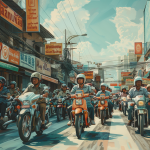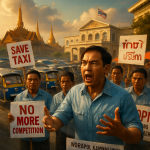In the bustling heart of Bangkok, a ripple of dissent echoed across Suvarnabhumi Airport as the sun cast its first rays on Wednesday morning. Amidst the chorus of everyday city life, a passionate protest materialized, led by taxi drivers who were intent on steering the public’s attention to their grievances against the ubiquitous Grab ride-hailing service.
These drivers, numbering about 50 and fueled by a sense of injustice, converged outside the Thai parliament with one mission—to demand the closure of the Grab service lounge at Bangkok’s key aviation portal, Suvarnabhumi Airport. Their ultimatum was clear: shut down the lounge or face the prospect of strategic blockades at the airport’s crucial junctures.
The protest was orchestrated under the vigilant leadership of Waraphol Kaemkhunthod, the head of the Thai Public Taxi Association. Setting their stage at entry gate 5, right across from the Ministry of Education on Ratchadamnoen Nok Road, they implored the powers that be—specifically, Prime Minister Paetongtarn Shinawatra and Transport Minister Suriya Jungrungreangkit—to lend an ear and give their plea the justice it desperately needed.
The crux of their argument lay in the perceived favoritism shown towards Grab—an international tech giant headquartered in the shiny innovation hub of One-North, Singapore. The decision to allow Grab drivers designated pick-up and drop-off points at the airport was a thorn in the side of these traditional taxi drivers, who feared losing their livelihood to the convenience of a virtual platform that could easily fit in the palm of your hand.
Mr. Waraphol passionately voiced his concerns, painting a vivid picture of an evolving transportation landscape where online platforms overshadow traditional taxis, relegating them to the shadows. “Imagine our airports, the grand entrances to our beautiful country, dominated by foreign apps,” Waraphol lamented. “They are, after all, our doors and windows to the world.”
He expressed frustration that regulatory frameworks, like the ministerial regulations for Hired Cars Carrying No More Than Seven Passengers and Ride-Hailing via an Electronic System, seemed tailored to benefit investors and tech developers, while leaving conventional cabbies to fend for themselves in an ever-modernizing world.
Amidst the clangor, voices of frustration sang out, blaming some app drivers for tarnishing Thailand’s image among tourists. Often mistaken for public taxi drivers in news reports, these incidents only further fueled the flames of unrest among the traditionalists. For Mr. Waraphol, the battle lines were drawn between an encroaching Grab and loyal taxi veterans serving their homeland.
“Choosing Grab would be akin to selling out our country, as this app does not belong to us,” Mr. Waraphol earnestly declared, underscoring the magnitude of what was at stake—not just jobs, but a slice of national identity.
Despite the palpable tension, the protesters maintained their stance was purely professional and not political. Their rallying cry was rooted in the quest for fair treatment and recognition in a rapidly shifting terrain of transportation. As the Wednesday deadline loomed, they vowed to escalate their peaceful protest if their demands were met with silence, threatening to transform Suvarnabhumi’s seamless operations into a landscape of peaceful resistance.


















I think these taxi drivers need to get with the times. Apps like Grab are super convenient and the future of transportation.
Convenience is one thing, but shouldn’t we also care about the livelihoods of our local drivers?
But if we hold back innovation for sentimentality, we’ll never progress. Think evolution!
True, but maybe there should be programs to help taxi drivers transition and adapt?
Honestly, it’s kind of unfair that a foreign app gets priority at our airports. Shouldn’t national interests come first?
National interests or tourist convenience? If travelers find it easier with Grab, doesn’t that benefit us long-term?
Convenience is a slippery slope. Today it’s taxis, tomorrow what? Local businesses?
Aren’t these protests a sign that the traditional taxi system needs a major overhaul to compete with apps?
I wonder if the government could balance this by upgrading and integrating traditional taxis with apps like Grab?
That’d be a win-win, but implementation is key. Would the taxi associations even agree?
It’s not just about convenience. Grab has actually made travel safer for me as a woman traveling alone.
It’s sad some drivers have to block roads just to be heard. That’s a sign of deeper issues we need to address.
Totally agree! We need better support systems instead of forcing people to resort to drastic measures.
The world is cruel. Adapt or die. The taxi industry in Bangkok needs a reality check.
But what about the tourists blaming regular cabbies for issues caused by app drivers? That seems unfair.
It’s easy to get confused, but maybe better signage or differentiation in car appearance is a start?
Yeah, clear labeling could help, but will the tourists even notice?
Supporting local taxis is like supporting local farmers—it’s about culture and tradition.
A diverse transportation system is what we need. Let apps coexist, but ensure fair competition.
Without regulation and fair competition, big tech will swallow everything in its path.
Regulations can work both ways—sometimes stifling innovation and sometimes ensuring fairness. It’s about balance.
True, but who’s deciding that balance? And who really benefits?
Why do people love defending big tech corporations? They deliver service but at what cost?
Because they offer what the market demands. Can’t blame a company for providing what customers want.
Globally, cities are moving towards app-based services to minimize wait times and maximize efficiency.
I respect the tradition, but if tradition stagnates and stops evolving, is it worth preserving?
Whenever there’s change, someone benefits and someone loses. The challenge is to minimize the loss and maximize community gain.
But who decides what’s in the community’s best interest? Drivers, the government, or the app developers?
Chaos at the airport is the last thing anyone wants. Maybe a dialogue is more productive than a standoff.
Grab helps cut through the chaos, but I do feel for the taxi drivers losing out on business.
If technology isn’t benefiting all sections of society, then maybe it’s not such a leap forward after all.
Here’s to hoping the government listens. If they don’t, it’s no surprise if more drastic measures are taken.
May I use your AI generated image ? I’m writing an article about it.